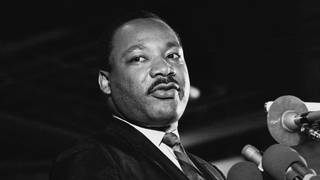
Topics
Today is Martin Luther King, Jr.'s Day. He was born in 1929. Last week, he would have turned 76 years old. In the early 1960s, King focused his challenge on legalized racial discrimination in the South where police dogs and bullwhips and cattle prods were used against Southern blacks seeking the right to vote or to eat at a public lunch counter. After passage of Civil Rights Act of 1964 and the Voting Rights Act of 1965, King began challenging the nation's fundamental priorities. He maintained that civil rights laws were empty without “human rights” — including economic rights.
Noting that a majority of Americans below the poverty line were white, King developed a class perspective. He decried the huge income gaps between rich and poor, and called for “radical changes in the structure of our society” to redistribute wealth and power.
By 1967, King had also become the country’s most prominent opponent of the Vietnam War, and a staunch critic of overall U.S. foreign policy, which he deemed militaristic. In his “Beyond Vietnam” speech delivered at New York’s Riverside Church on April 4, 1967 — a year to the day before he was murdered — King called the United States “the greatest purveyor of violence in the world today.”
Time magazine called the speech “demagogic slander that sounded like a script for Radio Hanoi,” and the Washington Post declared that King had “diminished his usefulness to his cause, his country, his people.”
We turn now to that speech that King gave in April 1967.
- Dr. Martin Luther King, Jr., giving his “Beyond Vietnam” speech at Riverside Church in New York on April 4, 1967.
For more of King’s speeches check: Pacifica Radio Archives.
King gave his speech “Beyond Vietnam” a year to the day before he was assassinated at the Lorraine Motel in Memphis, Tennessee. On the day of King’s assassination, Robert Kennedy was in Indianapolis, Indiana campaigning for president. He announced the assassination of Martin Luther King on April 4, 1968.
- Sen. Robert Kennedy, speaking in Indianapolis, IN, April 4, 1968.
For more of King’s speeches check: Pacifica Radio Archives.
The night before he was killed, King gave his last major address in Memphis, Tennessee. He was there to support striking sanitation workers as he built momentum for a Poor Peoples March on Washington.
- Dr. Martin Luther King, Jr., giving his “I Have Been to the Mountain Top” speech in Memphis on April 3, 1968.
For more of King’s speeches check: Pacifica Radio Archives.











Media Options